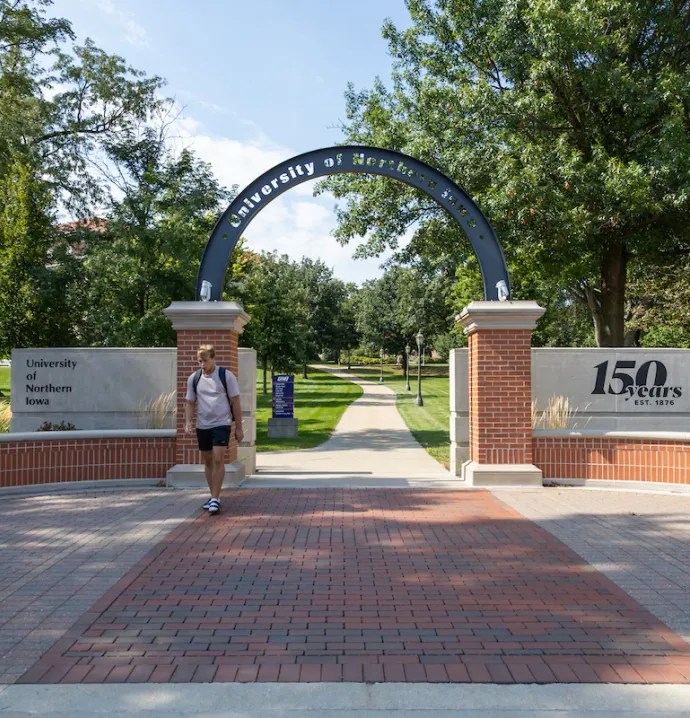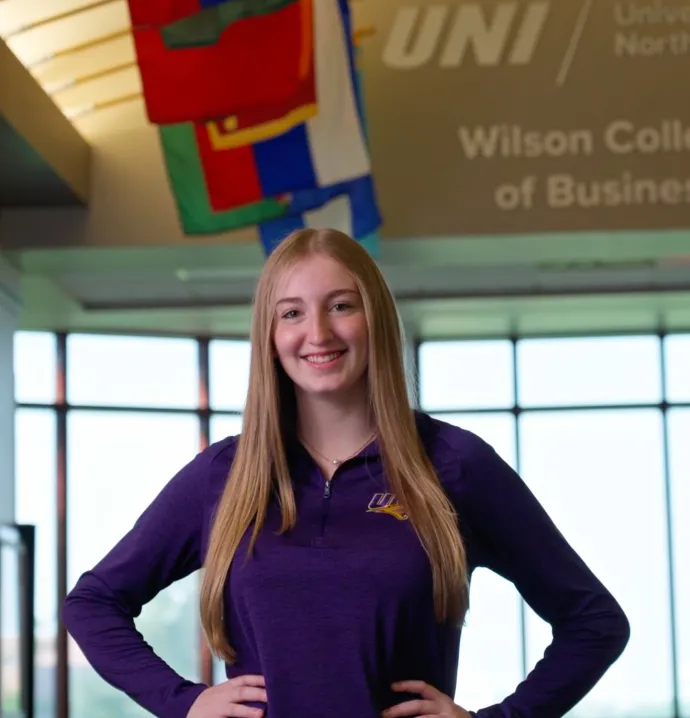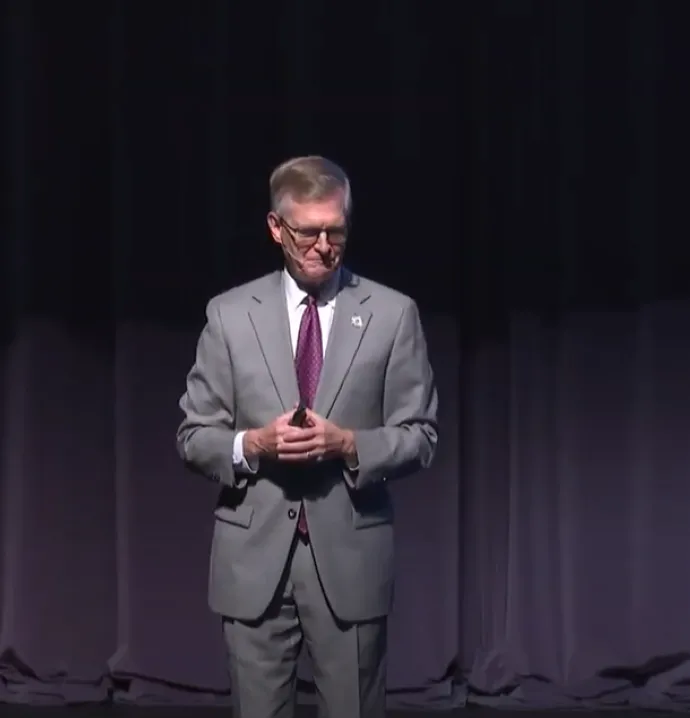Providing food in a desert: UNI helps bring community garden to life
Providing food in a desert: UNI helps bring community garden to life
Under a cloudy sky on the first day of May, Emily Dvorak and two University of Northern Iowa students pushed seedlings of broccoli and cauliflower into freshly tilled soil at the People’s Community Garden in downtown Waterloo.
The garden is an offshoot of the People’s Community Health Clinic, a nonprofit health care clinic that provides affordable community medical care. Now in its second year, the garden project is one of several AmeriCorps programs managed by UNI, which has taken a lead role in working to address food insecurity in the Cedar Valley region, where thousands lack reliable access to nutritious foods even before the coronavirus pandemic.
It’s the brainchild of People’s Community Health Clinic CEO Christine Kemp, who saw the need for fresh produce in the community after participating in UNI’s Veggie Voucher program - another component of its AmeriCorps work addressing food insecurity. Last year, the garden produced almost 2,000 pounds of produce, and it was all given away to the clinic’s patients and community members, many of whom struggle to access or afford fresh vegetables.
“UNI has been an outstanding partner. From the beginning, they have led with heart and passion and they truly find joy in providing our patients with fresh fruits and vegetables,” Kemp said. “We could not have started or maintained this project without them.”
This early in the year, the 21 garden beds are mostly barren, but small signs of life are starting to appear in the 90-foot long plots - a row of spinach here, small tufts of carrot and radish there. The humble beginnings foretell the bounty that lies ahead.
Dvorak, who graduated from UNI in December with a degree in public health, has managed the garden during her one-year tenure as an AmeriCorps VISTA (Volunteers in Service to America) member.
The experience opened her eyes to an issue that is pervasive in the community.
“(Food insecurity) becomes really real when you hear directly about issues community members are facing,” Dvorak said. “There have been people who have told me about how they don't have a refrigerator, so to be able to get a bundle of produce they could use that day had a big impact. That's something that had never occurred to me before.”
Many of the garden’s customers are minorities or refugees who both struggle to afford produce and find transportation to grocery stores outside of their neighborhoods. Downtown Waterloo has been identified by the U.S. Department of Agriculture as a food desert, meaning the poverty rate is higher than 20% and one-third of its population lives more than one mile from a supermarket or large grocery store.
“Garden space is a privilege to have,” Dvorak said. “A lot of these families are living in apartments or housing that don’t have a lot of land space. A lot of the individuals lack transportation, and the closest thing they can get to is a gas station.”
The community garden has started making a dent in the issue. Last summer, the garden distributed produce to 744 households and impacted 2,277 people, leading to an average savings on groceries of $123 a week.
Volunteers have poured more than 900 hours of work into the garden and they have seen its impacts first-hand.
“There was one family who came in once a week and thanked us so much for the fact that they could get produce,” said Rose Simon-Ressler, a graduate student in UNI’s community health education who gathered much of the data illustrating the garden’s impact. “They didn’t have a garden. Just seeing that they were consistently using it shows it is making a difference in people’s lives. It shows that if you have ground and have people who are passionate about giving back to the community, good things can happen.”
“So many people were in awe that a healthcare clinic would grow free produce and give it to the clients,” Dvorak said. “We had people offer us money, but we had to say ‘no, it’s free.’”
In all, almost 20,000 people in Black Hawk County are food insecure, meaning they lack reliable access to a sufficient quantity of nutritious food, according to the garden’s 2019 annual report. Moreover, 50% of families in the county utilize Iowa’s Free and Reduced Lunch program, compared to 40% statewide.
And while the People’s Community Garden is helping combat these issues, it’s not the only UNI AmeriCorps program focused on alleviating food insecurity.
One program, called Greens to Go, is also helping tackle the lack of fresh produce in Waterloo neighborhoods.
The program, which was also managed by Dvorak, has been in operation for five years. Through a partnership with local growers, the project’s staff goes to area farms and picks produce and then sells it at-cost the same day at a mobile produce stand.
“We’re featuring the freshest vegetables in neighborhoods that didn’t have it,” said Kamyar Enshayan, director of UNI’s Center for Energy and Environmental Education (CEEE), which houses the AmeriCorps programs related to food security. “All of a sudden, low-income neighborhoods now have access and can buy fruits and vegetables that are fresh and inexpensive. And UNI students are running the whole thing.”
Last year, the stand made almost 370 transactions, selling about $1,700 of produce, which was reinvested into area farmers.
Another program is Veggie Vouchers, which inspired Kemp to start the People’s Community Garden. UNI distributes $3 vouchers to area health clinics, which gives them to patients. The vouchers can be redeemed at local farmers’ markets and provides another pathway for food insecure families to access fruits and vegetables. Last year, almost $14,000 of vouchers were redeemed by 36 local producers.
Beyond helping the community, these programs also benefit the students who help manage them.
“(The programs) provide a rich learning experience for our students to learn about the very community where they live while serving that community,” Enshayan said. “The members involved in this program learn that better systems are possible and we can create change. It empowers them. It’s a perfect example of what an institution of higher learning should do and we’re doing it.”
For Dvorak, her one-year tenure as an AmeriCorps VISTA member was a springboard for the next step in her career. She was recently hired by the CEEE as a program assistant in environmental health.
“It’s a really great, immersive experience,” Dvorak said. “I feel like I’ve learned more than I ever imagined about how our community works and about broader systems, especially the food system. Every day is a new learning experience.”




